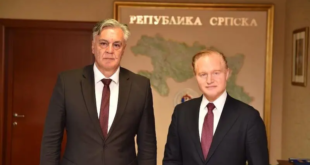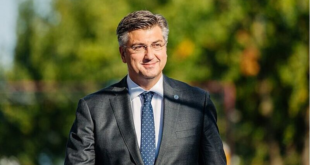The president of the ICTY has granted the early release of Milan Gvero, sentenced by a first instance to five years in prison for his role in the Srebrenica genocide. Gvero was released from detention today.
Gvero was assistant commander for moral, legal and religious affairs of the Main Staff of the Army of Republika Srpska, VRS and directly subordinated to general Ratko Mladic in July 1995 when more than 8,000 men and boys were killed in Srebrenica and more than 25,000 expelled by Army of Republika Srpska, VRS, forces.
Mladic was indicted for war crimes by the International Criminal Tribunal for the former Yugoslavia 15 years ago, but he is still on the run.
According to the first instance verdict, pronounced on June 10, Gvero made “a significant contribution to the joint criminal enterprise” that had the goal of removing the Bosniak (Bosnian Muslim) population from Srebrenica.
According to the sentence: “Gvero knew of the plan to forcibly remove the populations from the Srebrenica and Zepa enclaves from its very inception and of the VRS’ role in this plan.”
The trial chamber found that “Gvero acted with the specific intent to discriminate on political, racial or religious grounds…”, but that he did not take part in removing the population or the killing that took place from July 13 on.
Gvero surrended in February 2005. In his decision, the president of the ICTY Judge Patrick Robinson wrote that Gvero served more than 1,500 days in detention, meaning “more than two-thirds of his prison term”, which makes him eligible for early release.
However, the president concluded that the gravity of the crimes he is accused of, “weights against” Gvero’s early release.
But, by the ICTY rules, the president can take into consideration the medical condition of the accused person in making the final decision on his release, and this was done Gvero’s case since he submitted documents showing that he needs “cardiovascular and dental treatment”.
The medical unit from ICTY detention concluded that treatments could be made in the Netherlands, adding that heart surgery can generally lead to “emotional and psychological problems”, possibly even PTSD (post traumatic stress disorder).
Gvero asked to undergo treatment at the Belgrade military medical centre VMA, in order to be able to communicate in his language, which, according to the doctors in the detention unit, can have a positive effect on his recovery.
The president concluded that Gvero’s psychological condition is not a factor that can determine his decision on early release, but that the need for the urgent surgery is.
The letter from the detention unit commander stating that Gvero has acted in accordance with the existing rules was also taken into consideration.
The prosecution objected to Gvero’s request for early release, saying that they are considering appealing the verdict and that his release could be “premature”.
Some of the trial chamber judges did not agree with the decision to grant Gvero early release, but “based on humanitarian grounds” the president granted the request.
The decision was made on June 28.
Milan Gvero was indicted together with six other high ranking military and police officers of Republika Srpska for genocide and crimes against humanity for their role in the crimes committed in Srebrenica. On June 10, the trial chamber issued the first instance verdict, sentencing Vujadin Popovic and Ljubisa Beara to life imprisonment for commiting genocide.
Drago Nikolic was sentenced to 35 years in prison for aiding and abetting genocide. Ljubisa Borovcanin was found guilty for aiding and abetting crimes against humanity and sentenced to 17 years in prison. Radivoje Miletic was found guilty for crimes against humanity and sentenced to 19 years’ imprisonment, while Vinko Pandurevic was found guilty of crimes against humanity and sentenced to 13 years in prison.
The defense and the prosecution have been given until September 8, 2010, to appeal the first instance verdict.
 Eurasia Press & News
Eurasia Press & News



